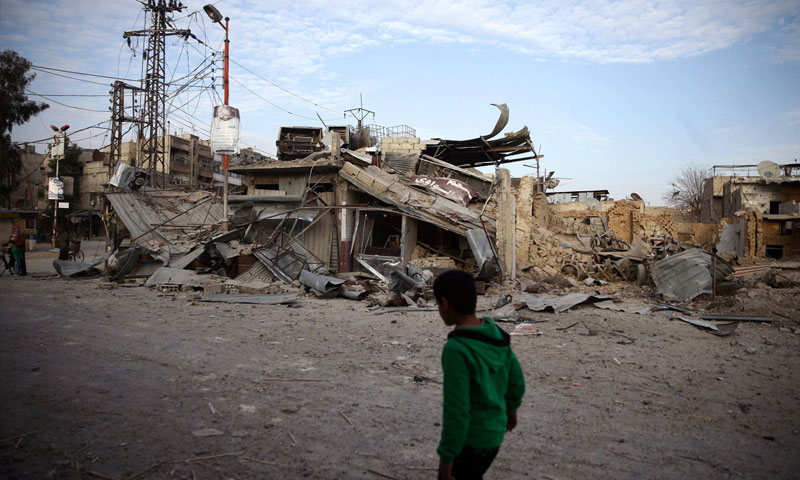



The recruitment campaigns launched by Assad’s forces in Damascus’ eastern Ghouta continue, since the regime allowed the civilians’ return last May.
The forced recruitment campaigns, first of all, targeted the makeshift housing centers which incubated more than 144 thousand civilians, according to official Russian statistics, who exited the area through safe crossings opened by Assad’s forces under a Russian auspice.
Assad’s forces initiated a number of campaigns at intervals, seeking to recruit the young men who finalized the “legalization of status” transactions.
The real number of young men who have been recruited at the housing centers is unknown, but what identical informed sources have confirmed to Enab Baladi is that the number has exceeded the two thousand mark, at a time where hundreds of young men are sent for investigation at the Syrian regime’s security branches.
The official narrative of both the Syrian regime and Russia, the guarantor of the reconciliation deal in Ghouta, is not mentioning any details about these campaigns, except for what is being reported by loyalist media arms, which describe the situation as targeting people affiliated with “terrorists.”
Assad’s forces have in the first week of August conducted a series of arrest campaigns that are considered the larger since they entered Ghouta last March; the campaigns targeted army dissidents and activists of the Syrian revolution. The forces have initiated the campaign in Saqba, Hamouriyah, Douma, Mesraba, Ein Tarma and a few towns in al-Marj area, in addition to Jisreen.
However, the areas that suffered the most were Arbin and Zamalka, for Assad’s forces have imposed a complete siege over the two areas and closed all their outlets, then started a large-scale arrest raid, according to what local sources have told Enab Baladi, on the condition of anonymity for security reasons.
The sources said that Assad’s forces have stormed the city, on the pretext that one of its checkpoints in the city has been targeted by an armed group.
The sound of heavy shooting was heard in the city, followed by a state of alert a few hours prior to the raids. Assad’s forces utilized the sound as a pretext and a cover to conduct the random arrest campaigns.
Since Assad’s forces announced their control over eastern Ghouta in May, the area was divided into enclaves through the forces’ checkpoints and some of the minor roads were closed with dust mounds to compel the cars to pass through checkpoints for investigation, according to Enab Baladi’s reporter in Ghouta.
The checkpoints are positioned at the crossroads which connect cities together, especially the city of Hamouriyah, which separates the city of Saqba from the two villages of Beit Sawa and Madira, as well as the city of Arbin.
Some of the minor roads between Zamalka and Arbin and Zamalka and Ein Tarma were cut, leaving open two entrances for civilians, one of which connects Zamalka with Arbin and another connects it with Ein Tarma.
Assad’s forces have also opened a military entrance from the side of the highway’s bridge, which it left open after its campaign as to get supplies.
Assad’s forces have arrested dissidents or military service escapees, but it did not transfer them immediately to the Military Barrack of al-Dreij, where recruits are given a military training prior to assigning them to military positions.
The detainees were sent to the air intelligence services branch in Harasta, after which a part of them were sent to the National Security Branch in al-Khateeb neighborhood, Damascus, to continue investigating them and conduct a legalization of status deal.
One of the men called for reserve military service gave Enab Baladi a statement, in which he said that he was investigated for over two months and the legalization of status was finalized before he was sent to the military barrack of al-Dreij where he received military training. Now he is on a leave, after which he will be sent to the division where he will be performing, pointing out that he does not know the place where he would be sent, whether his former division or a new destination.
The arrest raids targeted local activists, civil community organizations and former media personalities, in addition to members of local councils and relief offices who are investigated about the sources from which they received funding during the opposition’s control and the data they have.
The security branches have also initiated arrest campaigns against the former “local council” members, and other members of the Rural Damascus Provincial Council in the city of Kafr Batna, central Ghouta, according to identical information provided by sources to Enab Baladi.
The sources added that the Syrian security forces have stormed homes and the detainees’ workplaces before they were led to an unknown destination, explaining that the reason behind the arrest is investigation about the aid sources offered to the old local council and its projects.
They are also detaining the members of the rest of the local councils, who preferred to stay in Ghouta rather than exiting the area to northern Syria for the same reasons.
if you think the article contain wrong information or you have additional details Send Correction